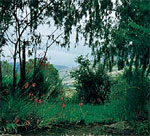| Safety, Health and Environment |
|||||
Safety Improvements to the safety performance have resulted in a 22 percent reduction in lost-time injuries from 1,45 per 200 000 hours worked in 2001 to 1,11 in 2002 and a 29 percent reduction in the number of shifts lost due to injuries. Tongaat-Hulett has a zero fatalities target. Regrettably two employees and three contractors lost their lives during the past year. Four of the fatalities occurred in the sugar operations and the other fatality occurred at the Hulett Aluminium plant in Pietermaritzburg. Two of the deaths were caused by fire, one by an explosion with two resulting from transportation accidents. The cause of every fatal incident is carefully reviewed and rigorously followed up at executive level. Accident reports are widely disseminated in a bid to avoid similar tragedies. All operations have in place specific risk assessment procedures, comprehensive safety guidelines and detailed operational standards. During 2002 the focus was on internal audits of safety management systems and procedures. The effectiveness of these measures will be tested in 2003 by third party audits at all the operations. We are confident that the system of verification by internal and external audits, together with continued improvements to safety management systems, will result in an improved level of safety performance. African Products is currently working towards OHSAS 18001 health and safety systems accreditation, which is compatible with its existing ISO 14001 environmental systems and ISO 9001 quality systems. Many of our operations have already utilised their safety programmes with exemplary results. Tambankulu Estates in Swaziland, with their recent NOSA Integrated SHE Five Platinum Star and ISO 9000 status, provides a benchmark for agricultural operations throughout Southern Africa. Health Formal prevention, hygiene monitoring and medical surveillance programmes have been instituted at the Group's operations in South Africa, Zimbabwe, Swaziland and Mozambique. Two major health challenges face the Group HIV/AIDS in all operations and malaria in non-South African operations. A comprehensive and holistic HIV/AIDS programme, underpinned by prevention, treatment, care and support has been implemented. The programme was recently extended to include the provision of anti-retroviral treatment to employees in South Africa and it is intended to extend this to other areas when the requirements for an effective anti-retroviral treatment programme have been attained. Tambankulu is covered by the Swaziland government's malaria control programme and effective interventionist methods that incorporate indoor spraying of residual insecticides. The company clinic diagnoses and treats malaria, while complicated cases are referred to the local government hospital. Triangle in Zimbabwe has established its own malaria control programme, using a synthetic pyrethroid insecticide. Residents are issued with prophylaxis with diagnosis and treatment taking place at the company's hospital and clinics. Xinavane and Mafambisse in Mozambique participate in joint programmes with the government which supplies a synthetic pyrethroid for application by the company. Group clinics and first aid centres, with qualified medical staff and visiting part-time doctors co-ordinated by a full time medical consultant, support occupational health targets. All operations have employees trained in first aid. Environment The Group embraces environmental stewardship to minimise the consumption of natural resources, reduce waste generation and manage the impact of its operations on the environment. The Germiston and Bellville mills of African Products have achieved ISO
14001 certification and the other mills are working towards certification.
Moreland has continued to roll out environmental policies in all its developments, in pursuit of the establishment and enhancement of ecologically sustainable natural habitats within the urban environment in the coastal strip north of Durban. Other developments, including the La Lucia Ridge Office Estate, iLala Ridge and Sibaya Casino access road and the M4 circle, are subject to ongoing environmental management audits. Traditionally a major user of its own "green" energy, Tongaat-Hulett Sugar has taken steps to improve co-generation initiatives. An example is the Maidstone sugar mill that supplies power to Eskom's Durban Metro grid. The Maidstone sugar mill's zero effluent project has completed its first phase, involving the recycling of factory, scrubber and boiler effluents. Relatively little effluent is produced at the Darnall sugar mill, while
manageable quantities leave the Felixton mill. An effluent drain system
has been proposed for the Amatikulu mill. |
